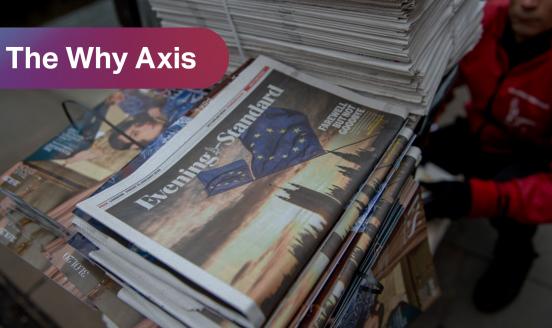The ECB’s ABC of ABS is missing a few letters
After the ECB last month announced a programme of private sector assets purchases, all eyes were directed at Frankfurt yesterday. As expected, the ECB
After the ECB last month announced a programme of private sector assets purchases, all eyes were directed at Frankfurt yesterday. As expected, the ECB unveiled further details of its new ABS and covered bond purchase programmes, revealing that important issues remain unresolved (while others may soon become thorny).
Draghi was rather vague about whether the TLTRO and ABS programme are mutually reinforcing or rather conflicting with each other in banks’ eyes
There was still no figure quoted for the programme. Draghi reiterated his September point saying that it is hard to give a figure because there are several interactions between ABS purchases, Covered Bond purchases and the TLTRO. He insisted that the overall impact should be such as to bring the ECB’s balance sheet back to the size it had at the beginning of 2012. Draghi was rather vague about whether the TLTRO and ABS programme are mutually reinforcing or rather conflicting with each other in banks’ eyes (something I previously addressed here).
Further measures are not ruled out. At the eve of the meeting, pressure had been mounting for the ECB to “do more” on the back of weak data. Perhaps in the attempt to counteract the scepticism that seemed to be growing after the disappointment of the first TLTRO auction, Draghi spelled out somewhat more clearly than usual that “despite the measures already taken, the Governing Council still stands ready to take additional measures”. This – by now, usual – statement, is hardly an indication that a full QE should be expected in a near future, considering how much reputational capital the ECB has put at stake in marketing the TLTRO and ABS programmes over the past months.
Details on the ABS and Covered bond programme (CBPP3) were unveiled. In both cases, purchases will be conducted in both primary and secondary markets, as it was the case for the two previous CBPP.
The third Covered Bond Programme (CBPP3) differs significantly from the two previous waves (2009 and 2011), and the ECB has evidently tried to make it look more open-ended. No target amount was revealed on announcement; there is no eligibility requirement related to the issue volume of a covered bond (it needed to be 300 million during the second and no less than 100 million during the first programmes); there is no maximum residual maturity on covered bonds accepted and fully retained securities are eligible. Purchases of covered bonds will start in mid October 2014 that – as we already pointed out in a paper and a post – is a tricky timing. Banks will in fact have to deal with the aftermath of the ECB’s supervisory assessment – including but not limited to possible capital needs identified. The ECB’s involvement in the business of buying banks’ bonds could put the Central Bank in an uncomfortable position and raise questions of incompatibility with the supervisory function that is carried out by the same institution – although supposedly behind Chinese walls.
The eligibility criteria for guaranteed mezzanine tranches of ABSs – has not been disclosed yet. This most likely signals that ECB has not yet found the way around the opposition it faces on this politically (highly) sensitive point
Concerning the ABS Purchase Programme (ABSPP), the programme will last for at least 2 years and both senior and guaranteed mezzanine tranches of asset-backed securities (ABSs) will be purchased. This is something that ECB’s President Draghi has been strongly fighting for in recent weeks, but the most important detail – i.e. the eligibility criteria for guaranteed mezzanine tranches of ABSs – has not been disclosed yet. This most likely signals that ECB has not yet found the way around the opposition it faces on this politically (highly) sensitive point. The purchases of ABS will however not start until the fourth quarter of 2014.
One issue on which the ECB’s official position was much awaited was the credit rating of the instrument that the programme would be targeting. Last week, the FT had reported that the ECB would announce derogations from the rating criteria set for ABS in the collateral framework, in order to broaden the pool of targeted securities. At present, in fact, the minimum grade for marketable assets to be eligible as collateral in ECB’s lending operations is BBB-. Currently, ABS rating is strictly linked to the rating of the sovereign, often constrained by country ‘ceilings’. In the case of Greece and Cyprus, a strict application of this principle would rule out purchases of ABS issued in these countries.
The ECB confirmed today that the Eurosystem’s collateral framework will be the guiding principle for deciding the eligibility of assets to be bought under the ABSPP and the CBPP3, but there will be some adjustments.
Draghi clarified that the rules governing eligibility for the asset purchase programmes are inspired by the fact that:
1 The Eurosystem will apply an issue share limit of 70% per ISIN, except in the case of ABSs with underlying claims against non-financial private sector entities resident in Greece or Cyprus and not fulfilling the CQS3 rating requirement; for those ABSs, a corresponding limit of 30% per ISIN will be applied.
- Outright purchases differ from lending against collateral (because in the second case the asset is only temporarily pledged on the Central Bank’s balance sheet);
- The asset purchase programme is focused on lending to SME, so the ECB will not buy structured ABS;
- The general aim is to be “as inclusive as possible, but with prudence”.
In practice, the ECB’s view of “prudence” means that assets bought should be “risk equivalent”. This has two major implications. The first one is operative: while ABSs and covered bonds from Greece and Cyprus – which are currently not eligible as collateral for monetary policy operations – will be included, the Eurosystem will buy relatively fewer of them1.
The second implication is instead more philosophical. Answering to a specific question, Draghi hinted to the fact that derogation would require the country to be under a programme to be applicable. He actually did a little bit more than hinting at it, as he even came up with a catchy phrase such as “no programme, no purchase” (and this is how e.g. Reuters also reported it). In fairness, this sounded striking, because it would be hard to see the rationale of subjecting a country to a programme before implementing a monetary policy measure that would be explicitly targeted at private sector assets.
Draghi hinted to the fact that derogation would require the country to be under a programme to be applicable
The issue is in fact considerably more vague in the two technical documents issued by the ECB after the press conference. The ABSPP one for example states that “for ABSs with underlying claims against non-financial private sector entities resident in Greece or Cyprus […], a derogation […] will be applied for as long as the Eurosystem’s minimum credit quality threshold is not applied in the collateral eligibility requirements for marketable debt instruments issued or guaranteed by the Cypriot or Greek governments”. After their sovereign ratings were slashed to the lowest levels during the crisis, the ECB decided to suspend the usual minimum rating criteria for the programme countries, so as to allow banks in these countries to pledge government bonds as collateral (which would not have been possible otherwise). This is still the case for Greece and Cyprus, and the ECB seems to be saying that the derogation in ABSPP will be applied to them “for as long as” the minimum credit quality threshold is suspended. And when is the minimum credit quality threshold is suspended? The ECB itself decided in 2012 that this will be the case for all countries “eligible for Outright Monetary Transactions or under an EU-IMF programme”.
So, putting the pieces together in a slightly more linear way, it looks like the ECB will buy Greek and Cypriot securities derogating from rating requirements, for as long as the minimum credit threshold is suspended, and the minimum credit threshold will be Suspended for as long as the countries will be under a programme. While being overly convoluted, this does look significantly less strong than Draghi’s own language. The ECB will most certainly be asked to clarify what the correct interpretation is.
What would happen to these ABS after a country like Greece were to exit the programme, if their rating were not upgraded?
But more importantly, what would happen to these ABS after a country like Greece were to exit the programme, if their rating were not upgraded. Would they be offloaded? And if so, how would that be justified? This point is definitely too important – especially for a country like Greece that is approaching the end of the second programme and is surrounded by rumours about the opportunity of a third one – to be left lost in the translation of central bank jargon.
Read more on the ECB and ABS
Asset-backed securities: The key to unlocking Europe's credit markets?
Addressing weak inflation: The European Central Bank's shopping list



